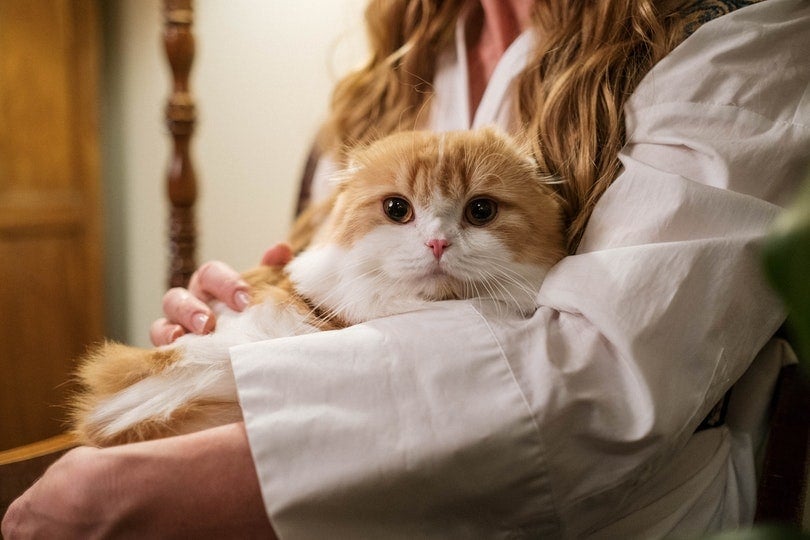Can a Cat Be a Service Animal? Facts & FAQ
By Brooke Bundy
Updated on

Click to Skip Ahead
Cats comfort us by purring and nudging their soft bodies against our outstretched hands. They engage us with their frisky antics, making us laugh, and then cry over spilled milk and smashed cups. But at the end of the day, we couldn’t imagine living without our cats snuggled at our side. Owning a cat has many health benefits, including better sleep, focus, and a sense of calm, which is especially beneficial for individuals struggling with anxiety and depression. In addition to mental health, one study by the National Institute of Health (NIH) found that small children who lived with more than one cat or dog actually have between a 66% and 77% lower risk of developing certain unrelated allergies and asthma1.
With all the benefits that cats can provide for our mental and physical health, it raises the question of whether cats can be service animals. Unfortunately, cats aren’t recognized as service animals under the Americans with Disabilities Act (ADA). Currently, a cat may only be registered as an Emotional Support Animal (ESA) or a psychiatric service animal, such as a cat assisting someone who has PTSD.
Why Aren’t Cats Considered Service Animals?
Only dogs qualify as service animals under the ADA. Under these rules, canines may be trained to become guides for the blind, communicators for the deaf, or even blood sugar monitors. Depending on the dog’s role and the severity of the condition, they may be considered service animals or ESAs when treating PTSD.
Although they sound similar, there’s an important practical distinction between service animals and ESAs. While your service animal may legally accompany you to the grocery store, fly in your cabin on a plane, or go to the mall, ESAs are usually only certified to appease housing and travel requirements. State and federal regulations prohibiting animals from entering food establishments still apply to ESAs, which means they won’t be able to go into all the places service animals typically can, such as restaurants.

Benefits of Registering Your Cat as an ESA
If you suffer from mental conditions such as anxiety, depression, or PTSD, you might want to consider registering your cat as an emotional support animal. Under the Fair Housing Act, your landlord cannot deny your cat tenancy, or require a pet deposit. Where you go, they go, no questions asked.
Prior to the COVID-19 pandemic, most airlines accepted ESAs into airplane cabins as long as they had documentation. However, as of 2021, this policy has been reversed due to amendments in federal law which now allow for more restrictions. Nowadays, you must call your specific airline to inquire whether they’ll accept ESAs in the cabin. If your pet is under 20 lbs., most times they can fly with you regardless of ESA certification, although they’ll probably charge you an extra fee.
Of course, airlines are still legally required to accept service dogs and psychiatric animals who assist with certain mental illnesses. Since psychiatric animals sometimes overlap with ESAs, you should contact the specific airline for more information before you book your flight.
How to Register Your Cat as an ESA
In order for your cat to qualify as an ESA, you must have an ESA letter signed by a licensed mental health professional. This can be from your local counselor, or through a certified online program such as Pettable. This document may be necessary for people such as landlords to accept your cat as an ESA.
Some landlords also require the licensed healthcare professional to list their credentials and license number in the letterhead at the top of the document. If you’re considering renting a new place, figure out a plan of action with your counselor before you sign your lease. You want to make sure your cat can live with you no matter what, and if they’re considered an ESA, you don’t have to pay any hefty pet deposits.

ESA Exemptions
Besides the recent changes in airline policies, there are, unfortunately, a few more possible exemptions to ESA privileges. The Fair Housing Act protects these animals in most renting situations, but there are a few exceptions such as:
- Houses with four or fewer units, if the landlord lives in one of the units
- A single-family home rented by the owner without a broker
- Senior housing
Conclusion
Research has proven that people who own cats are happier than those who don’t. And not just happier, but calmer, more productive, and sleeping better—all of which can have a huge effect on their health overall. While cats cannot currently be registered as service animals, they may qualify as emotional support animals if their owners suffer from professionally diagnosed mental issues such as anxiety, depression, and PTSD. Registering your cat as an ESA gives both of you extra security if you rent. Under the Fair Housing Act, you are legally allowed to bring your emotional support cat with you in most housing situations without paying enormous pet fees or deposits. This fact, coupled with your cat at your side, should give you another reason to sleep soundly at night.
Featured Image Credit: cottonbro, Pexels












